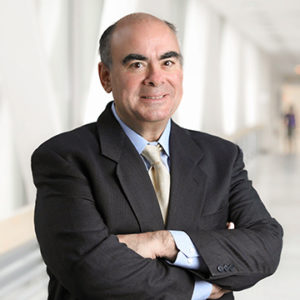
Frank Palella, MD, the Potocsnak Family – C.S.C. Professor of Medicine in the Division of Infectious Diseases, joined Northwestern University Feinberg School of Medicine faculty in 1992 after completing his internal medicine residency and infectious diseases fellowship at Northwestern’s McGaw Medical Center. He began his tenure shortly after the height of HIV/AIDS epidemic and has since become a world-renowned expert in sexually transmitted diseases and leader in optimizing care for patients.
Palella was recently named associate director of Northwestern’s new Potocsnak Longevity Institute and director of the institute’s Potocsnak Center for Aging and HIV. Under Palella’s leadership, the center will work to increase the lifespan and “healthspan” (the portion of life during which persons live free from illness and impairment) of people living with HIV through cutting edge research, educational opportunities and patient care.
Read a Q&A with Palella below.
What drew you to studying HIV and sexually transmitted diseases?
During my medical training, I had my first experiences caring for persons living with HIV during a time when AIDS was a leading cause of death and disease among young Americans and was an almost universally fatal illness. I was moved and inspired by the immediacy and urgency of those times and the courage and dignity of these amazing individuals for whom I provided medical care and their loved ones with whom I forged close bonds.
Since then, with the advent of effective treatments for HIV, the prognosis for persons with HIV has improved dramatically, and they routinely can survive into older age. These wonderful developments have also given rise to important challenges, including the special needs of persons aging with HIV. Persons with HIV often encounter older age-associated medical illnesses to which we are all susceptible (like heart disease, cancer, frailty, dementia) at a younger age than do persons without HIV. For these reasons and others, there is a need to undertake routine screening, pre-emption and treatment for aging-associated medical conditions at an earlier age for persons with HIV than for persons in the general population.
Furthermore, persons with HIV are also more likely to be adversely impacted by disparities in care that social determinants of health can affect, like stigma, poverty, isolation, addiction and mental illness. Hence, the care of aging persons with HIV needs to confront and take into consideration all of these issues.
In light of recent news of a third person potentially being cured of HIV, how do you reflect on the progression of the field?
Finding a cure for HIV has for decades been a “holy grail” to which medical providers and researchers caring for persons with HIV aspire. Progress is being made in our understanding of what achieving an HIV cure might ultimately require. While there have been a very few highly publicized HIV “cures” among persons living with both HIV and serious cancers who underwent stem-cell transplantation to treat their cancer and then experienced an apparent eradication of their HIV, we are clearly not yet at a point medically or scientifically where we can lay claim to readily or widely available treatments that permanently eradicate HIV from an infected person.
Nevertheless, our current treatments for HIV, which are often as simple as taking a single pill daily or receiving a couple of injections every other month, can suppress the virus and thereby markedly extend health and survival.
What efforts are you currently excited about at The Potocsnak Center for Aging and HIV? What is your vision for the future of the center?
The Center will seek to optimize and address all of the factors mentioned above in order to increase both the lifespan and healthspan of persons with HIV.
Experts from across medical disciplines will collaboratively address the totality of challenges and healthcare needs confronting aging persons with HIV and will provide comprehensive medical care, devise therapeutic interventions through conducting cutting edge research, and provide education to clinicians and medical scientists. This will be the first center of its kind and will benefit greatly from its existence within the newly formed Potocsnak Longevity Institute within the Feinberg School of Medicine.






